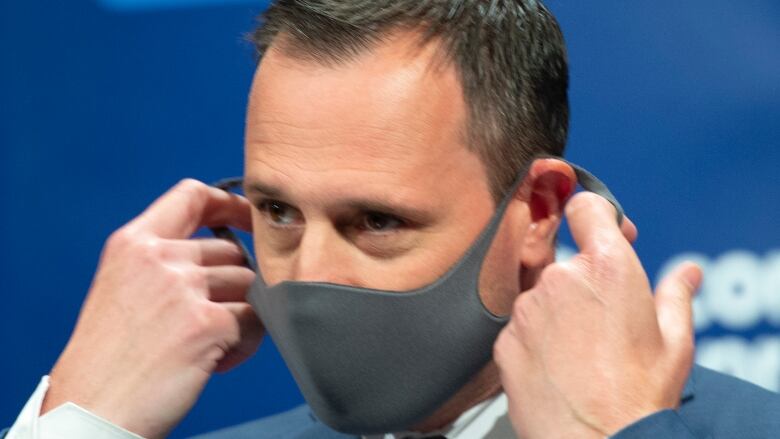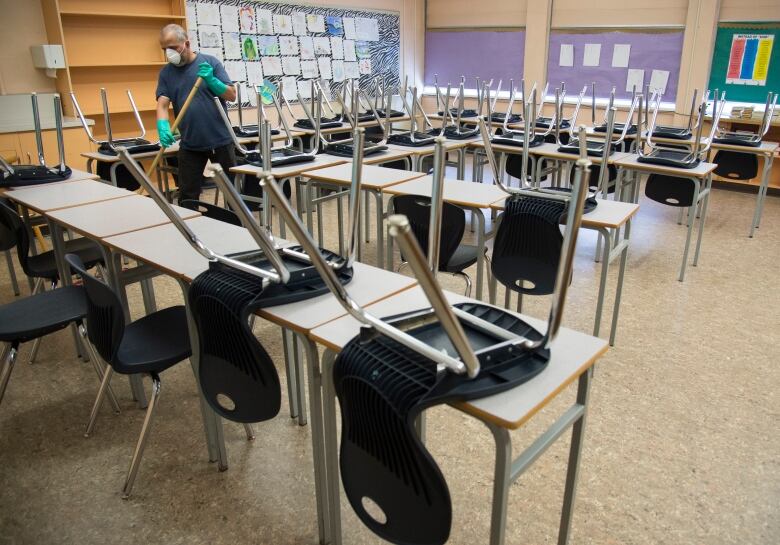Air purifiers not a 'magic bullet,' Quebec government expert says in laying out back-to-school changes
Province delays report cards, cancels ministerial exams and tightens mask rules

A senior public health adviser to the Quebec government says air purifiers are "not a magic bullet" to help contain COVID-19 in classrooms.
At a news conference Friday, Dr. Richard Mass cautioned it has not been clearly demonstrated that they are an efficient way to stop the spread of the virus.
"We don't recommend those filtration devices, first because it has not been demonstrated clearly that it is efficient to limit transmission," Mass said, following the release of a 72-page report by the INSPQ on ventilation in schools.
"In a class where you don't know who could be infected, just putting one device in one spot it is kind of impossible that it will be efficient."
Mass appeared to go further than the report, which concluded that air filtration systems can help reduce airborne particles of COVID-19 if used effectively,even if they won't eliminate aerosols or solve the problem of transmission entirely.
He said the challenge of properly installing and maintaining a filtration system, coupled with the size of an average classroom, means it's unlikely they wouldbe an effective way to curb transmission in schools and, furthermore, could "create a false sense of security."
While air purifiers can be effective in some smaller workplaces and health-care settings, Mass said wearing masks, maintaining distance and following other health guidelines would likely be moreeffective.
Caroline Duchaine, a microbiologist with expertise in aerosols atUniversit Laval who reviewed the report, agreeswithMass.In a dental clinic, she said, an air purifier can be effective,but not so muchin larger spaces.
"Of course, if there was an unlimited budget and people wouldput several of those devices in a classroom, it would probably help in decreasing the concentration of particles," she said in an interview.
"But in a situation where there is limited resources and I'm sure people will not invest in six or seven air purifiers in a single classroom it is certainly not the best option."
School boards go their own way
The English Montreal School Board and the Lester B. Pearson School Board have already set aside millions for air purifiers.
The EMSB is planning to hold a photo-op on Monday to install a filtration system at Pierre Elliott Trudeau Elementary School in Rosemont.
In a statement following the news conference, EMSB Chair Joe Ortona said the school board has analyzed the air quality in its 55 buildings and will go forward with the installations.
"We did our due diligence before making this decision," he said.
Lester B. Pearson said it would also stick with its plan, saying in a statement it will "continue implementing any and all measures designed to limit the spread of COVID-19 in its schools and buildings."
When asked about the school boards, Education Minister Jean-Franois Robergesaid: "I think it's really important to follow the recommendations of our health specialists."

If a school board chooses to install air filters, Roberge said they should have the devices "analyzed by provincial government health experts."
The Education Ministry also said, in a statement, it tested the CO2 levels in 330 school buildings and found that roughly three per cent of classes failed to meet air quality standards, and will require immediate changes. It is planning to conduct further tests this year.
New rules for school
Elementary schools are set to reopen on Jan. 11, as scheduled, while high school students will continue distance learning until Jan. 18.
Here's a breakdown of what's new for students:
- The first report card, which was expectedon Jan. 22, will be postponed to Feb. 5. The weight of the first report card will be reduced to prioritize the second report card.
- Ministerial exams for primary and secondary students are cancelled given the difficulty in adhering to health guidelines.
- Students should immediately get tested for COVID-19 if they show any symptoms, not wait 24 hours as previously advised, given that the flu is virtually non-existent this year.
- A free online tutoring program will be available at the end of January to students. Discussion forums will be open seven days a week. The program will also offer an app where students can getvideos, testimonials and other resources. The ministry also aims to provide psychological support to students through the app.
- Elementary school students will be required to wear masks in hallways, common spaces and buses. They won't be required to wear masks outside. Students in Grades 5 and 6 will be required to wear them in the classroom.
- All high school and continuing education students will be required to wear procedural masks, which provide a higher level of protection. The government will provide teachers and students with two such masks per day.
Masssaid the government would not be providing procedural masks to younger students because of alack of smallermasks that fittheir faces.
"There's an issue of adaptation to the face of the students," he said. "For secondary school, there shouldn't be too many problems, if they are too large a bit for the attachment of the mask, people can make some knot on them and adapt them to their face, which is not the case for people in primary school."
With files from Sarah Leavitt












_(720p).jpg)


 OFFICIAL HD MUSIC VIDEO.jpg)
.jpg)



























































































